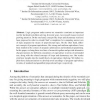Free Online Productivity Tools
i2Speak
i2Symbol
i2OCR
iTex2Img
iWeb2Print
iWeb2Shot
i2Type
iPdf2Split
iPdf2Merge
i2Bopomofo
i2Arabic
i2Style
i2Image
i2PDF
iLatex2Rtf
Sci2ools
137
click to vote
FOIKS
2008
Springer
2008
Springer
Alternative Characterizations for Program Equivalence under Answer-Set Semantics Based on Unfounded Sets
Logic programs under answer-set semantics constitute an important tool for declarative problem solving. In recent years, two research issues received growing attention. On the one hand, concepts like loops and elementary sets have been proposed in order to extend Clark's completion for computing answer sets of logic programs by means of propositional logic. On the other hand, different concepts of program equivalence, like strong and uniform equivalence, have been studied in the context of program optimization and modular programming. In this paper, we bring these two lines of research together and provide alternative characterizations for different conceptions of equivalence in terms of unfounded sets, along with the related concepts of loops and elementary sets. Our results yield new insights into the model theory of equivalence checking. We further exploit these characterizations to develop novel encodings of program equivalence in terms of standard and quantified propositional...
Related Content
| Added | 26 Oct 2010 |
| Updated | 26 Oct 2010 |
| Type | Conference |
| Year | 2008 |
| Where | FOIKS |
| Authors | Martin Gebser, Torsten Schaub, Hans Tompits, Stefan Woltran |
Comments (0)

